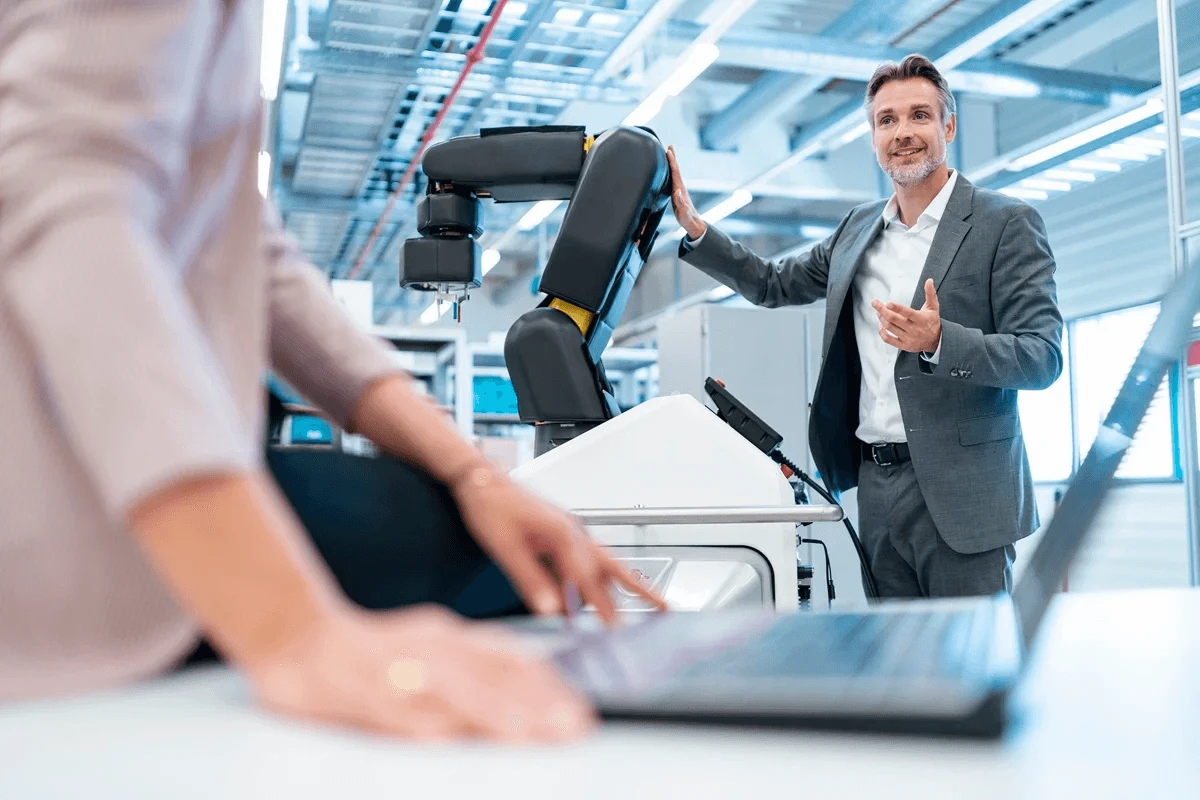Do you keep hearing the term Industry 4.0 and wonder what it really means for you and your business? You’re not alone. Whether you’re running a small business or managing a large enterprise, understanding what is Industry 4.0 will give you a powerful edge in today’s competitive market.
This guide breaks it all down in simple terms and shows you how you can take advantage of the fourth industrial revolution.

What Is Industry 4.0 and Why It Matters Today?
Let’s keep it simple: Industry 4.0 is the next big step in how things are made, delivered, and even taken care of. It’s the phase where digital technology—things like smart machines and real-time data—changes the way businesses work.
So, when you hear the question “What is Industry 4.0?” just think of it as a smarter, faster, and more connected way of doing business. It’s where factories and systems aren’t just automated—they’re intelligent. Machines and software now work hand-in-hand, sharing information and making decisions to keep everything running smoothly.
What Does That Look Like in Action?
You’ll see things like:
- Augmented reality helping workers fix machines faster.
- Machine learning spotting patterns and predicting what’s coming next.
- Predictive maintenance stopping problems before they happen.
In short, Industry 4.0 brings smart, practical tools that make your business more efficient, reliable, and ready for the future.

A Quick Look Back: The Four Industrial Revolutions
To really understand what Industry 4.0 is all about, it pays to take a quick look at how we got here. Each industrial revolution brought huge changes that shaped the way we live and work today. Here’s a simple breakdown:
First Industrial Revolution (18th Century)
This is when steam power came onto the scene. Small workshops grew into big factories, and for the first time, machines took over tasks people used to do by hand. It was the true start of modern manufacturing.
Second Industrial Revolution (Late 19th – Early 20th Century)
Electricity became a game changer. Thanks to things like assembly lines, factories could mass-produce goods faster and more efficiently than ever before. This is when production really took off.
Third Industrial Revolution (Late 20th Century)
Enter computers and automation. Machines got smarter, and industries started using electronics and information technology to speed things up and cut costs. This shift brought us into the digital world.
Fourth Industrial Revolution (Today)
And now, we’re living in the Industry 4.0 era. It’s all about making everything smart—from factories that run themselves to 3D printing and data that allows businesses to make better choices. It’s a full-on digital transformation that keeps things running smoothly and more efficiently than ever.
How Industry 4.0 Is Revolutionizing Modern Business
Industry 4.0 is reshaping the way businesses operate by making processes more efficient and responsive. With real-time insights, companies can quickly identify and address issues, minimizing delays and keeping production on track. This helps businesses stay competitive and improve their overall performance.
By leveraging data, businesses will be able to optimize their workflows, reduce waste, and make more informed decisions. This leads to smarter resource management, cost savings, and a more streamlined operation, allowing businesses to achieve more with less.
Perhaps most importantly, Industry 4.0 offers greater flexibility. Companies can adapt to changes in demand, market conditions, or supply chain disruptions, ensuring they remain agile and able to deliver high-quality products consistently and on time.

The Cutting-Edge Technologies Powering Industry 4.0
At the core of Industry 4.0 are several advanced technologies that work together to revolutionize how businesses operate. Here’s a closer look at each one:
Big Data and Data Analytics
Industry 4.0 thrives on the massive amounts of data generated across operations. By collecting and analyzing this data, businesses can uncover patterns and insights to drive smarter, more strategic decisions. This leads to improved efficiency, reduced costs, and better customer experiences.
Machine Learning
This technology allows computers and systems to “learn” from past experiences and continuously improve their performance. Over time, machine learning algorithms can identify trends, optimize processes, and predict future outcomes, all without the need for constant human input.
Cyber-Physical Systems
These systems combine physical machines with digital elements like sensors, software, and networked systems. This integration allows for seamless communication and control, enabling automated processes that react and adapt to changing conditions on the fly, enhancing productivity and safety.
Smart Manufacturing
Smart manufacturing uses automated systems and real-time data to optimize production processes. Machines can adjust themselves based on current conditions, leading to more efficient production cycles, reduced waste, and quicker time-to-market.
Additive Manufacturing (3D Printing)
Additive manufacturing allows for on-demand production of customized parts and products. This technology enables businesses to create highly specific items without the need for traditional manufacturing processes, reducing lead times and the need for large inventories.
Augmented Reality (AR)
AR overlays digital information onto the physical world, providing workers with real-time visual assistance. Whether it’s for training, maintenance, or troubleshooting, AR makes complex tasks easier and faster, improving accuracy and productivity.
Internet of Things (IoT)
IoT connects machines, devices, and systems to share real-time data. This constant flow of information helps streamline operations, enhances monitoring, and improves decision-making. With IoT, businesses can track everything from machine performance to inventory levels, ensuring smoother workflows and quicker responses to issues.

Why Outsourcing Is Key to Accelerating Your Industry 4.0 Journey
Adopting Industry 4.0 may feel overwhelming, and it’s not something you can just jump into overnight. It takes investment, planning, and most importantly, the right expertise. That’s where outsourcing comes in as a game-changer for your business.
By partnering with experienced outsourcing firms, you gain access to top-notch skills and the latest technology without the headache of building everything from the ground up. Whether you’re looking to implement smart manufacturing systems, manage data analytics, or integrate predictive maintenance, outsourcing can speed up your transition to Industry 4.0.
The best part? Outsourcing frees up your time and resources. Hence, with a knowledgeable outsourcing partner who truly understands Industry 4.0, you’re already ahead of the game, ready to outperform the competition.
Future-Proof Your Business with Outsource Philippines’ Smart Solutions
Now that you have a clear understanding of what Industry 4.0 is, you’re probably wondering how to leverage it for your business. That’s where Outsource Philippines steps in to support you in navigating this transformation.
We offer a wide range of smart IT solutions designed to help you implement Industry 4.0 technologies seamlessly. From setting up cyber-physical systems to managing big data, our expert team can optimize your production processes and improve overall efficiency.
With our expert team on your side, you can transform your business into a smart, tech-driven operation. We’ll help you reduce costs, improve productivity, and deliver high-quality products faster than ever. Trust our IT solutions to future-proof your business, keeping you competitive and ready for whatever challenges the next phase of industry brings.









